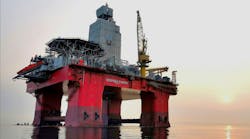By the OGJ Online Staff
LONDON, Feb. 19 --
BG Group PLC, the major UK oil and gas producers formed from former government-owned assets, and Oil & Natural Gas Corp. (ONGC), India's largest state-run exploration and production company, are now locked in what could develop into a long and acrimonious dispute over which firm should operate some of India's most important offshore projects.
BG has completed the purchase of the entire share capital of Enron Oil & Gas India Ltd. (EOGIL) for $350 million from Enron Corp. The assets include 30% of Tapti gas field and Panna-Mukta oil and gas field and 62.64% of the CB-OS/1 exploration license.
The acquired company will be renamed BG Exploration & Production India Ltd. and will continue to operate these assets, taking over from EOGIL.
However, ONGC is disputing BG's right to remain as operator and has said that operatorship rights do not automatically transfer with the Enron sell-off. BG had originally bid $388 million for the Enron assets with the condition that it remain operator but dropped its bid to $350 million and withdrew its demand for automatic operatorship.
ONGC has now increased pressure on BG to rescind operatorship and said, "We've decided that operatorship should be with us. Operatorship can't be transferred automatically with the sale. It's based on a consensus among partners."
BG's partners in the Tapti and Panna-Mukta offshore operations are ONGC, with 40%, and Reliance Industries Ltd., with the remaining 30%. The other partners in the CB-OS/1 license are Hindustan Oil Exploration Co. 17.36%, Tata Petrodyne 10%, and ONGC 10%.
Negotiations are to be scheduled between the partners to discuss the issue, but Indian bureaucracy could mean that they will be long and drawn-out, and it is understood that BG Group will defend the status quo, pointing out to its long experience of successfully developing offshore gas fields.
A BG spokesman said that the issue was one for legal negotiations and that this process would start shortly.
Frank Chapman, BG Group chief executive, said, "These assets are important to the group's long-term strategy for India and will enable us to build a material gas position in the country."
The issue could affect BG's ambitions to become a major supplier in one of the world's fastest-growing gas markets. India's need for imported gas may increase fivefold by 2012 to 218 million cu m/day, according to Indian government statistics.
The Panna, Mukta, and Tapti fields hold more than 170 MMboe and are an important part of BG's strategy in India. It also owns 65% of Gujarat Gas Co. (GGCL), which supplies 40 MMcfd in the western province of Gujarat. And BG owns 50% of Mahanagar Gas Ltd. (MGL), which operates the gas distribution network in Mumbai, India's commercial capital.
GGCL is India's largest private gas distribution company, with a network of 1,550 km of transmission and distribution pipelines and with gas sales volumes of 349 million cu m in 2000. However, the gas market in Gujarat is currently supply-constrained, and the Enron acquisition is part of a long-term business objective to secure additional gas supplies from indigenous sources and imported LNG.
MGL is a 50-50 joint venture owned by Gas Authority of India Ltd. and BG Group and established in 1995 to construct a gas distribution system in Mumbai. The project involves laying steel and polyethylene pipe to connect commercial, industrial, and domestic customers in the greater Mumbai area. By June 2001, MGL had connected 60,000 domestic, 360 commercial, and 30 industrial customers.
In addition, over 22,000 vehicles, mostly taxis, have been converted to run on compressed natural gas supplied by MGL. These are fueled by 23 CNG dispensing stations spread across Mumbai.
BG further plans to build a $400 million plant in Gujarat to import 5 million tonnes/year of natural gas, equal to 25% of India's current demand. India has proven gas reserves of 22.8 tcf, a sixth less than the UK for 17 times as many people.
